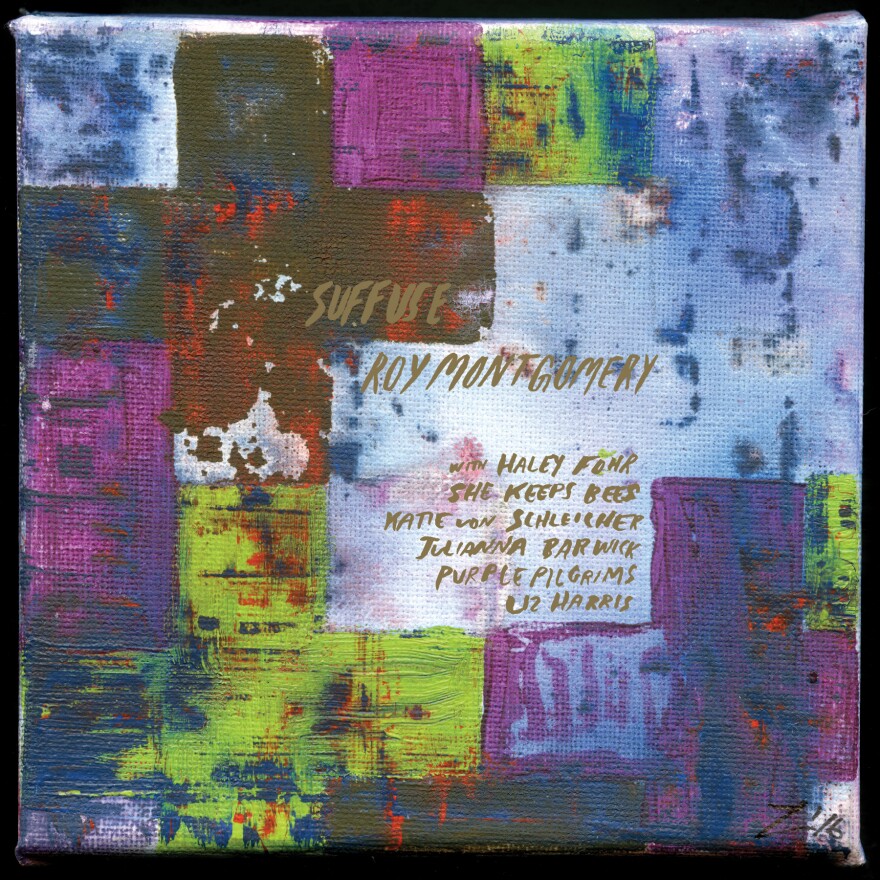Note: NPR's First Listen audio comes down after the album is released. However, you can still listen with the Bandcamp playlist at the bottom of the page.
New Zealand guitarist Roy Montgomery has never seemed to care much about who heard him, or, really, how often they did. During the last forty years, he has become an essential fixture of his country's florid rock underground, despite a pronounced streak of restless elusion. Montgomery has gone for the better part of decades without new music and frequently pivoted between projects and vibes, picking up an interest just to put it down. In the early 1980s, for instance, he fronted the youthfully agitated post-punk trio The Pin Group, the first band to sign to the essential New Zealand syndicate, Flying Nun; it lasted a year, its reunion even less. And in the late 1990s, well into his next phase as a solo guitarist who still conjures both phosphorescent sunsets and rain-washed mornings, he teamed with kindred stateside spirits Bardo Pond for an essential piece of international psychedelic rock as Hash Jar Tempo. After a perfect second album, they never returned.

In 2016, after a decade-plus absence, Montgomery released RMHQ, a four-LP set where each album applied a specific approach to a distinct mood. He sang on the first set, R: Tropic of Anodyne, despite being his voice's own worst critic (having once said of his singing, "It's lazy. ... I'm very rarely on target"). Pushed against the feathery delicacy of his padded guitar pieces, his burly tone could indeed be jarring.
On his latest album, Montgomery tries a novel disappearing act that works. He asked other singers to interpret his words, an idea that morphed into the six entirely new songs of Suffuse,with the first half written entirely by Montgomery and the back half penned by their respective singers.
The seven singers of Suffuse —all women, offering words he largely wrote as he plays guitar — are an artistically diverse lot. Where Haley Fohr of Circuit des Yeux tends to command songs with stentorian bravado, Grouper's Liz Harris peeks from around the edges of her music only long enough to remind us that there is a human behind her distant though intimate beauties. Where Julianna Barwick builds cathedral-like mirages from her wondrous intonations, She Keeps Bees' Jessica Larrabee borders on blues singer status, like Cat Power telling The Black Keys to step to the back of the stage. Brooklyn's Katie Von Schleicher favors a tempestuous brand of twisted pop, while the mesmeric tunes of New Zealand sisters stare forever into the middle distance. Still, one by one, they become Montgomery's voice and foil.
If this sounds like an invitation to chaos, where each track feels isolated and concerned more with each singer's signature than with a unified project, it is. But Montgomery sidesteps that pitfall with a solution that seems paradoxical. He first foregrounds every singer, so that their voices are pushed squarely into the spotlight. This is as true of Von Schleicher, whose surprisingly arching torment suggests drum-less doom-metal during "Outsider Love Ballad No. 1," as it is of Harris, whose vocals stretch across "Landfall" like a century's accretion of spider webs. They, not Montgomery, are the clear stars here.
But he tugs at the corners of his guitar track and their vocals, gently pushing them against one another until the boundary between the singer's lead role and the guitar's supporting status blur. During "Outside Love," Von Schleicher's voice droops and moans and curls into a snarl in exact proportion to Montgomery's own playing, which hovers between the hangdog and the irate. And during "Landfall," Harris and Montgomery play a slow-motion game of cat's cradle, her voice and his guitar slipping past one another in perfect synchronicity.
These moments — where Montgomery's little guitar symphonies dovetail so gracefully with the sound of the singer who leads them — are the thread that holds Suffuse tight, that makes it more than a grab bag of disconnected guest spots. Yes, there is a cohesive sadness here, as on "Apparition," written about the only time Montgomery met Nico, or the heartsick "Outsider Love." But Montgomery uses this thematic start to take on a surprising new role — that of producer in the hip-hop sense, where the beatmaker has recruited various friends for a string of songs to build an entire album that functions as a gestalt. Living at the edges of ambient soundscapes and psychedelic rock, operatic gusto and folk approachability, Suffuse is a testament to a vision Montgomery has spent four decades shaping — powered, let's be honest, by singers more captivating than he will ever be.
Copyright 2021 NPR. To see more, visit https://www.npr.org. 9(MDEwMTk5OTQ0MDEzNDkxMDYyMDQ2MjdiMw004))











